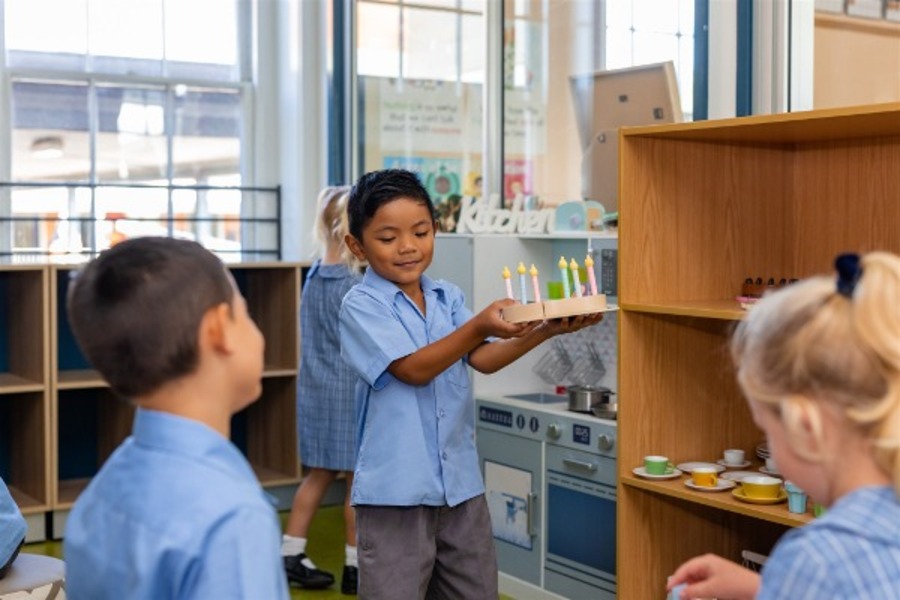St John the Baptist Primary School, Maitland honours its commitment to quality Catholic education through its provision of high quality educational programs by which each student is enabled to reach their full potential.
We are a community of learning characterised by high expectations for students to achieve excellence, academic rigour, innovation and purpose, within an environment that engages, empowers and enables.
The curriculum at St John the Baptist is based on the NSW Education Standards Authority (NESA) Curriculum. Students receive instruction in all Key Learning Areas.
KEY LEARNING AREAS
St John the Baptist offers a complete set of study areas to its students.
- English
- Mathematics
- Religious Education
- Science and Technology
- Human Society and its Environment (HSIE) History, Geography
- Creative and Performing Arts
- Personal Development/Health/Physical Education (PDHPE)
Personnel
Class teachers at St John the Baptist implement the NSW Syllabus for the Australian Curriculum in all KLAs, providing explicit teaching and learning experiences which develop positive values and attitudes towards the use and study of each subject.
The Learning Support Teacher will assist in the assessment of students’ literacy and numeracy levels and will support the classroom teacher so that opportunities for curriculum differentiation are implemented to ensure all students have access to the curriculum and that individual literacy and numeracy needs are being met. They will also assist with the development of special programs for students with disabilities, when required.
The Learning Support Assistant, where allocated, will assist the class teacher within the classroom context or on a one-to-one or small group basis following programs devised by the class teacher and/or Learning Support Teacher.
The Teacher Librarian will support the teacher through provision of programs of work to complement what is being taught in the classroom and by providing further opportunities to develop skills in information technology.
The Library Assistant will assist in the development of literacy by assisting in the retrieval of resources and assisting students to locate suitably levelled books.
Parent and Community volunteers are encouraged to assist classroom teachers during the day in activities such as reading groups in the English teaching session, Art activities, Science activities and so on. Learning goals in English and Mathematics are communicated with parents and activities provided to assist with practise of the skills at home.
Teaching of Religion
Our Religion program presents to the students core doctrine, knowledge, understanding and skills in the tradition of the Catholic Church in accordance with the Diocesan Syllabus.The teaching of Religion at St John the Baptist occurs via the implementation of the mandatory Diocesan K – 12 Religion Syllabus and Support Units in all classes throughout the school.
The teaching of Religion goes beyond the teaching of knowledge. At St John the Baptist students and their families are part of a Catholic community which gives witness to its faith through pastoral care and support.
At St John the Baptist the curriculum encompasses Religion and the six Key Learning Areas as prescribed by BOSTES (Board of Studies Teaching and Educational Standards NSW). These Key Learning Areas are:
ENGLISH
Students learn to read, write, speak, view and represent language. They learn about the English language and literature through working with a wide range of spoken, visual, multimedia and digital texts. Students learn how language varies according to context and how to communicate to a range of audiences for different purposes. They learn to read for information and pleasure. Students gain a sound grasp of language structures, punctuation, spelling and grammar and learn to think in ways that are imaginative, creative and critical.
MATHEMATICS
Students develop their thinking, understanding, competence and confidence with numbers, shapes and measurement. They learn to add, subtract, multiply and divide whole numbers, fractions and decimals. Students learn to measure time and calculate with money. They learn geometry, algebra and how to work with data and graphs and they use mathematical knowledge to communicate, problem-solve and reason.
SCIENCE & TECHNOLOGY
Students develop skills in thinking, investigating and problem-solving. Science and Technology gives them knowledge and skills in scientific investigation and inquiry, design and applied technologies. Students pose questions, test ideas and develop and evaluate arguments based on evidence.
HUMAN SOCIETY AND ITS ENVIRONMENT (HSIE)
HSIE provides opportunities for students to explore how people, events and forces from the past have shaped their world. They investigate their personal and community identity and gain an understanding of their nation and its place in the world. The two strands of HSIE are: Geography (the study and understanding of interactions between people, places and environments in order to become informed citizens through a process of inquiry) and History (exploring the past to develop a critical understanding and the impact of the past on the present).
CREATIVE ARTS
Students experience visual arts, music, drama and dance. They learn to appreciate the meanings and values that each art form offers as they perform, express themselves and explore their creativity.
PERSONAL DEVELOPMENT, HEALTH AND PHYSICAL EDUCATION (PDHPE)
Students develop the knowledge, skills and attitudes needed to lead healthy, active and fulfilling lives. They learn about the importance of good food and regular exercise and develop positive attitudes towards a healthy lifestyle. Students learn how bodies grow and change over time. They learn skills to play individual and team sports, and the values of sportsmanship and teamwork.


